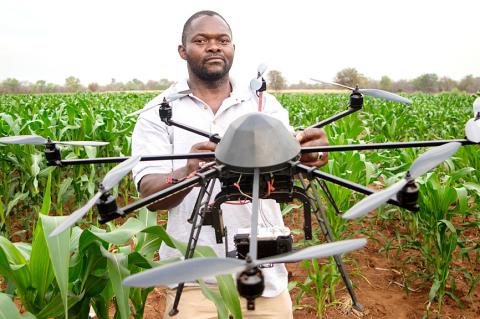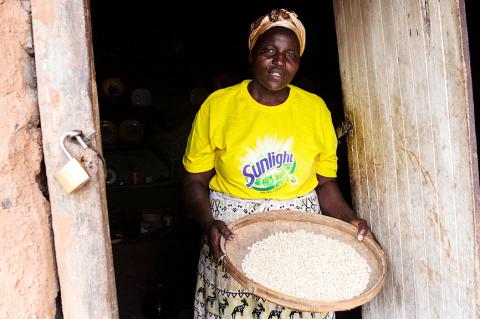Under the scorching Zimbabwean sun, cattle seek shade among stunted thorn bushes in the drought-prone district of Zaka, where crops wither due to increasing temperatures and changing weather patterns.
Severe lack of rain across southern Africa has hit the country hard, with government officials saying a quarter of the population faces starvation. Many villagers are forced to survive on wild fruit.
Maize, the country’s traditional staple crop, has suffered a series of poor harvests.

Photo: AFP
Late rains this year again wrecked the planting season and the little that is growing has often been destroyed by heat.
It may not help the immediate crisis, but science is providing a glimmer of hope for smallholder maize farmers in Zimbabwe.
The International Maize and Wheat Improvement Center — known by its Spanish acronym CIMMYT — is conducting trials in Zaka on hybrid maize seeds adapted to tackle drought and high temperatures.

Photo: AFP
The seeds are developed to survive dry conditions with 60 percent less water than normal and in temperatures of up to 35°C, CIMMYT researchers said.
“If we get these new maize seed varieties that will help us a lot,” said Ceaser Chavizha, a smallholder in Zaka, Masvingo Province, south of the Zimbabwean capital of Harare.
Like many farmers in the region who rely on maize produce, Chavizha has been forced to survive on food handouts as his crops have been reduced to dried husks.

Photo: AFP
“We cannot continue with handouts as we have fields that we can work on to produce food for our own, so we hope the new maize seeds will help us improve our yields,” he said.
Maize meal crops are ground and turned into mealie meal, used to make porridge and other food, but the El Nino-induced drought has wrecked arable fields, grazing pastures and water sources.
The drought scourge is high on the agenda at UN Conference of the Parties climate talks in Morocco, where world leaders and experts are discussing how to implement the landmark Paris agreement that was signed last year. The pact aims to cap global warming at below 2°C, compared with pre-industrial levels.
Once referred to as the breadbasket of Africa, Zimbabwe used to be an exporter of maize, but now requires about 2 million tonnes a year to feed itself, aid organizations say.
Cosmos Magorokosho, a senior scientist and maize breeder at CIMMYT, said the ultimate goal of hybrids was to help farmers develop long-term sustainable agriculture.
“Basically it means transferring genes from one plant to another type so that you create a new type that has the characteristics that you want,” he said.
He said CIMMYT had received US$500,000 funding from USAID to develop the new maize variety for drought-prone areas in east, central and southern Africa.
Magorokosho said that more funds were needed to extend the project, criticizing the Zimbabwe government’s delay in adopting new maize hybrids.
“There is a layer of testing that is required by the authorities which is a little bit long... We would wish it is shortened so that the varieties can get quickly to the farmers,” Magorokosho said.
CIMMYT, a non-profit research project headquartered in Mexico, is also working on a vitamin A-rich maize variety that is already in production in other parts of Africa and Latin America.
This year, Zimbabwe’s cash-strapped government declared a “state of disaster” in most rural areas, with at least 2.4 million people in urgent need of food aid.
Sekai Makonese, another small-scale farmer in Zaka, welcomed the potential impact of scientific intervention, saying she was counting on hybrids becoming widespread as soon as possible.
“Long ago, we used to farm maize with no problems, but now we have a problem with climate change and now our crops fail before we harvest,” she said.
The Zimbabwe government is yet to approve the mass distribution of the seeds, but the product is already available at some agricultural outlets.

CHIP WAR: Tariffs on Taiwanese chips would prompt companies to move their factories, but not necessarily to the US, unleashing a ‘global cross-sector tariff war’ US President Donald Trump would “shoot himself in the foot” if he follows through on his recent pledge to impose higher tariffs on Taiwanese and other foreign semiconductors entering the US, analysts said. Trump’s plans to raise tariffs on chips manufactured in Taiwan to as high as 100 percent would backfire, macroeconomist Henry Wu (吳嘉隆) said. He would “shoot himself in the foot,” Wu said on Saturday, as such economic measures would lead Taiwanese chip suppliers to pass on additional costs to their US clients and consumers, and ultimately cause another wave of inflation. Trump has claimed that Taiwan took up to

SUPPORT: The government said it would help firms deal with supply disruptions, after Trump signed orders imposing tariffs of 25 percent on imports from Canada and Mexico The government pledged to help companies with operations in Mexico, such as iPhone assembler Hon Hai Precision Industry Co (鴻海精密), also known as Foxconn Technology Group (富士康科技集團), shift production lines and investment if needed to deal with higher US tariffs. The Ministry of Economic Affairs yesterday announced measures to help local firms cope with the US tariff increases on Canada, Mexico, China and other potential areas. The ministry said that it would establish an investment and trade service center in the US to help Taiwanese firms assess the investment environment in different US states, plan supply chain relocation strategies and

Hon Hai Precision Industry Co (鴻海精密) is reportedly making another pass at Nissan Motor Co, as the Japanese automaker's tie-up with Honda Motor Co falls apart. Nissan shares rose as much as 6 percent after Taiwan’s Central News Agency reported that Hon Hai chairman Young Liu (劉揚偉) instructed former Nissan executive Jun Seki to connect with French carmaker Renault SA, which holds about 36 percent of Nissan’s stock. Hon Hai, the Taiwanese iPhone-maker also known as Foxconn Technology Group (富士康科技集團), was exploring an investment or buyout of Nissan last year, but backed off in December after the Japanese carmaker penned a deal

WASHINGTON POLICY: Tariffs of 10 percent or more and other new costs are tipped to hit shipments of small parcels, cutting export growth by 1.3 percentage points The decision by US President Donald Trump to ban Chinese companies from using a US tariff loophole would hit tens of billions of dollars of trade and reduce China’s economic growth this year, according to new estimates by economists at Nomura Holdings Inc. According to Nomura’s estimates, last year companies such as Shein (希音) and PDD Holdings Inc’s (拼多多控股) Temu shipped US$46 billion of small parcels to the US to take advantage of the rule that allows items with a declared value under US$800 to enter the US tariff-free. Tariffs of 10 percent or more and other new costs would slash such